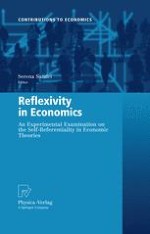
2009 | OriginalPaper | Buchkapitel
Reflexivity and Self-Reference
Erschienen in: Reflexivity in Economics
Verlag: Physica-Verlag HD
Aktivieren Sie unsere intelligente Suche, um passende Fachinhalte oder Patente zu finden.
Wählen Sie Textabschnitte aus um mit Künstlicher Intelligenz passenden Patente zu finden. powered by
Markieren Sie Textabschnitte, um KI-gestützt weitere passende Inhalte zu finden. powered by
The phenomenon of referring is pervasive and regards all fields of human thought and activity, so much that it appears to be an inescapable basis of all that can be thought, conceptualized and expressed. The human capability of referring creates the basis for ordering the subjective perception of the world, for interpreting events, for interacting with others, etc., thus creating the basis for all activities which regard human cognition and which are essential for individual survival. Being able to establish self-references is even a necessary prerequisite for self-change and behavioural adjustment. Furthermore, the reflexive capacity underlies basic problemsolving abilities and makes mental adaptiveness possible.
Consciousness (in the form of self-consciousness) can be identified as the main source of reflexivity for human thought and action. Individuals think and are simultaneously conscious of their thought, so that all discourses are both directed to outward reality (the external world) and to the inner reality of the individual who formulates them, since she is conscious of expressing them. Therefore it can be said that each human discourse, being a human way of thought formulation, has a self-referring nature.
This chapter is dedicated to the analysis of the polyvalent concept of “self-reference.” After its definition which will be accompanied by an overview of the different kinds of reference relations some common varieties and possible taxonomies for self-reference will be presented. The polymorphism of self-reference will be illustrated by its implications for formal and natural language. Logical consistency of self-reference in its different forms and contexts of appearance will then be discussed, in that the relation between self-reference and paradoxes will be deepened and some guidelines for testing the legitimacy of self-references will be extrapolated. The chapter concludes discussing the role of self-reference for human understanding as well as for social and individual decision making.